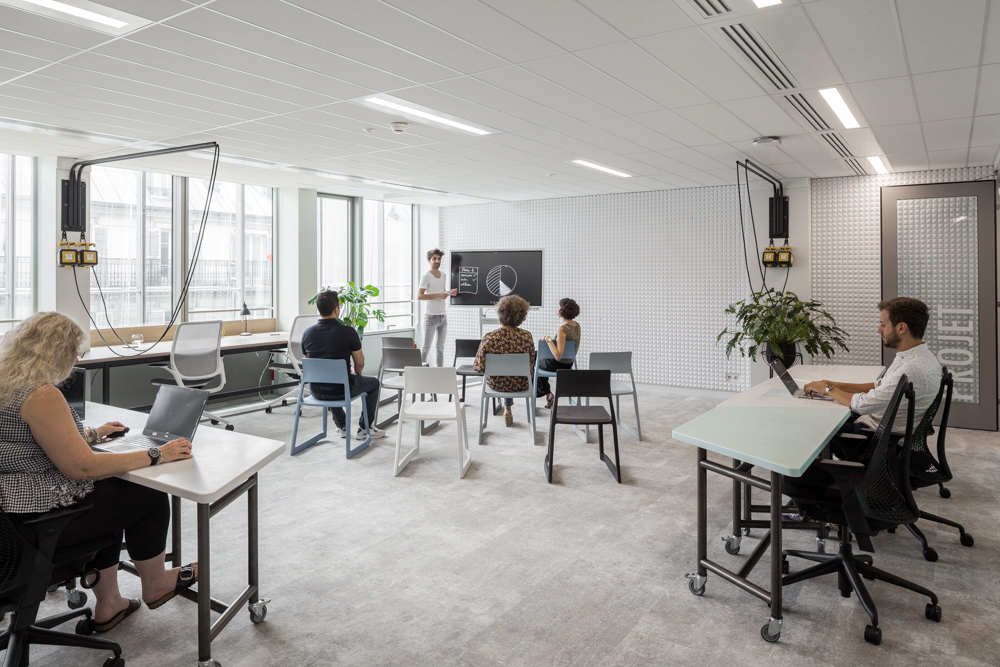- Home
- EN
- Kardham Group
- News
Juniors and seniors put to the test of the health crisis: what impact?
December 2020

The health crisis is putting employees to the test, leading them, often for the first time, to work remotely. At a time when the affirmation of teleworking is being questioned, it is important to review the results by employees of this period.
Article by Marc Bertier, Workplace consultant and Nicolas Cochard, R&D Manager within the Kardham Group, published in the Special Edition Grand Paris IDF of the Personal Review of the ANDRH.
An unprecedented work experience with a positive result
The Kardham Group, whose activity revolves around transforming work environments, conducted a 5-month study of more than 2,600 private sector employees working in offices. The objective is to understand the experience of remote work through the feelings of employees in order to understand the disruptions of their working environment seen as a whole. And let's put it simply: the results are very positive for the entire responding population. The remote work during the health crisis was rather well lived. But is this the case for everyone?
The necessary taking into account of variables to refine the balance sheet
Since a population is never homogeneous, taking global results into account is insufficient because it does not make it possible to refine the approach by the variables which make it possible to understand a group (gender, age, seniority in the company, status…). The diversity of testimonies and studies show the evidence of disparities in lived and perceived experience. One of the most questioned variables is the differences between generations. Have the “digital natives” had a different experience of remote work from their elders? To find out, we extracted data on respondents aged between 18 and 30 (juniors) and over 51 (seniors), ie 427 and 565 people respectively out of a total of 2,617 respondents in France. So let's take stock.
A very slight generational gap
Contrary to popular belief about different expectations for different ages, juniors and seniors have experienced distancing in almost the same way. The two groups teleworked shortly before but now wish to do more telework. Variations in results open up some avenues for reflection to think about its possible deployment within companies.
- Work and domestic sphere: contrary to popular belief, the differences are very small in terms of perception related to housing. Juniors and seniors very widely find that their home is suitable for remote work (82.6% and 87.9% respectively), despite significant differences in nature and conditions of employment. In addition, overall, the daily rhythm was little changed during this period. Juniors and seniors slept well and ate well. However, if the juniors shifted their meal times a little more than the seniors, they managed their sleep schedules better than their elders. Is this a sign of a different porosity between professional and private life, of a greater concentration of working time versus a spreading out of working time?
- Commitment and managerial relations: for all, the stated commitment is strong, more than before the health crisis, even if this is more the case for seniors than for juniors (+ 16.4%). Likewise, for the two groups, there was no loss of sense of integration (78.5% of juniors and 81.4% of seniors feel as much or more integrated in the company). These figures should be compared with the strong mobilization of management and the support perceived by employees during the crisis.
In addition, it should be noted that during the crisis period, the managerial relationship was judged to be very good. The practices implemented to manage the exceptional situation seem to have borne fruit. Here again, the differences are not significant between the two age groups, apart from the fact that young people have a little more the impression of having to justify their work to their superiors (36% of juniors against 32.7% of seniors). Is this effect linked to the context or to remote management? - Work organization and performance: at the same time, juniors believe they have gained more autonomy and organization than seniors (+ 3.1%). In addition, while everyone believes that they have had a good concentration (> 85%), the elderly believe that they have a little more than the youngest (+ 2.1%). Likewise, the older ones felt more motivated and productive than the juniors (+ 7.9%).
A good assessment of remote work during the crisis, points of attention for the deployment of telework
Out of 65 criteria for evaluating the experience of working remotely during confinement, 59 obtain positive results (majority of respondents agree), which shows that the deployment of telework, which one can imagine massive, s 'will build on a positive experience of remote work during the crisis.
However, questions arise as so many points of attention for HR managers. For example, if respondents generally indicate a home suitable for teleworking, questions related to postures and home equipment arise in the long term, which must naturally be confronted with the question of age because juniors and seniors can all suffer from poor postures of working from home. In addition, if the good management of the pace of work seems to emerge from this survey, the porosity of professional life / personal life is apparently a real subject to be raised because teleworking must rhyme with gain and not loss of QWL. We can also question the commitment and attachment to the company, which remains very positive in our survey but less so for the juniors.
Finally, the experience of remote work in relation to age questions a fundamental aspect of business life: the circulation and transmission of knowledge. In the knowledge economy, the transfer must take place between generations to preserve this intangible wealth which is the strength of an organization. The results we have show that the exchanges were mainly limited to the immediate team, which can present a risk of silos, harmful to both horizontal and transverse dynamics. We know the fruitfulness of the exchange between juniors and seniors and if the bursting of working space-time seems to be a fundamental trend, it is not a question of transforming the nomad into a wanderer, the autonomous into a solitary. . The removal of employees from knowledge exchange circuits is a major risk for companies.
The coming months will be very challenging. HR staff will be at the heart of the search for points of balance between face-to-face and distance learning, which will redefine the traditional framework of work. But when it comes to age, it will be necessary to guard against everything a priori on the supposedly different expectations between juniors and seniors because this is not always verified. The major trends will then have to be compared to a specific context in order to find contextualized solutions, the only valid ones.

